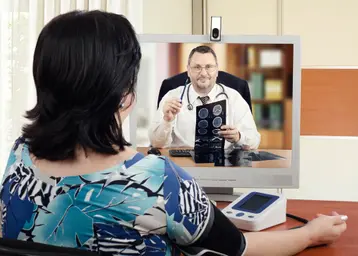The Benefits of Offering Telemedicine to Your Employees

Table of contents
- 1.The rise of telemedicine
- 2.Your employees will love the convenience
Insurance carriers are always finding new ways to offer services while containing costs. One of the biggest costs identified was the practice of individuals using emergency rooms for non-life threatening, or even minor health incidents, such as a severe cold or a child’s recurring ear infection.
The use of urgent care clinics, which often have weekend and after-hours availability with low copayment amounts, has become a popular and convenient alternative for families. Their use could help curb emergency room use, but there is still room for improvement.
The rise of telemedicine
Advancements in technology -- including video chat apps -- have taken things a step further, making the delivery of remote healthcare or “telemedicine” more convenient than ever. Now you can receive care without being in the same room as your healthcare professional. This is why telemedicine options have become one of the most recent innovations to help contain the cost of providing healthcare services.Rather than go to a doctor’s office or urgent care clinic, insurance carriers are providing telemedicine options. Employees can get treatment at home or the office for basic health incidents with a simple copayment. Telemedicine can include services such as:
- 24/7 nurse case manager phone lines and online chats
- Direct email access to your regular physician
- Virtual visits using video teleconferencing with an emergency room doctor
Depending on the symptoms or condition, the nurse case manager or virtual visit physician can even prescribe medications without a physical exam. This is usually for minor conditions like an infection, rash or virus that has common symptoms. Plus, smart phones make sending a photo of the infection site or rash right to a healthcare provider easier than ever. Do keep in mind, however, that some states have regulations which limit telemedicine services and prescription writing.
Your employees will love the convenience
Thanks to these health plan features, which can save time, money and add convenience for busy professionals and families, a badly timed flu virus, a child’s earache or even a pink eye infection does not have to mean a trip to the doctor’s office or a visit to urgent care.Check to see what health plan options are available in your state and any state regulations that may impact services. TriNet’s health plans also offer different telemedicine options and features. If you have questions about our health plans and services, be sure to ask your local TriNet sales representative, client service representative or employee solution center.
This communication is for informational purposes only; it is not legal, tax or accounting advice; and is not an offer to sell, buy or procure insurance.

Teri Lowder
Table of contents
- 1.The rise of telemedicine
- 2.Your employees will love the convenience





